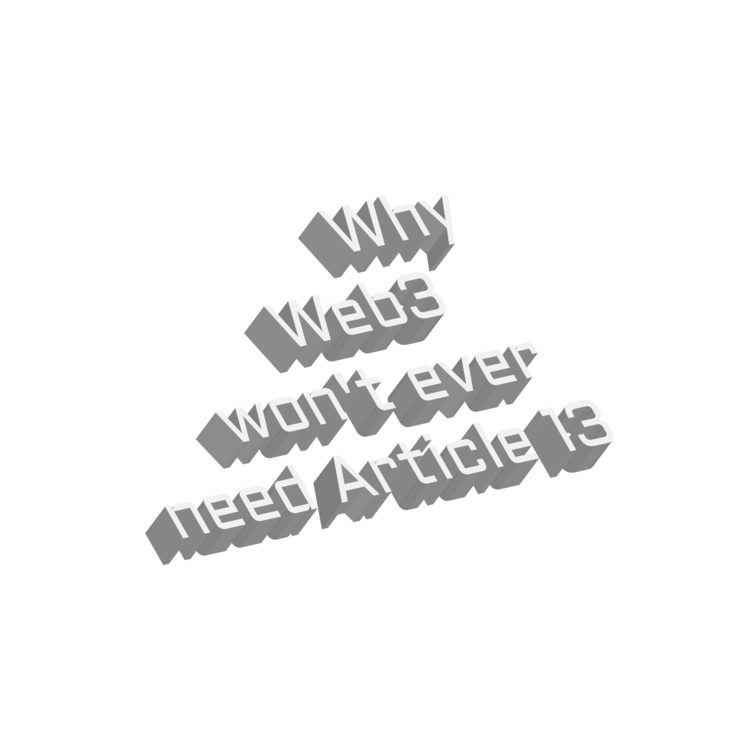Latest news about Bitcoin and all cryptocurrencies. Your daily crypto news habit.
By Olya Green
Build it, and they’ll come won’t work anymore, because Amazon and Google already built it. How do we fight back for the free Internet?
Back in 2010 I wrote my diploma thesis on how the free-for-all Internet was sweeping away the copyright legislation based on Digital Millennium Act basically acknowledging that there’s no such thing as online copyright, mostly because any attempt to regulate the information freefall is doomed to fail. All the prominent copyright lawyers of the time agreed with this narrative, and so did I. However, the itchy feeling deep down inside made me wonder if that was fair to creators and artists alike. Little did I know that some 9 years later my naive beliefs in equal copyright protection both for in offline and online will be backed by a major European law-making institution. Yet, the question is still up in the air: will the proposed regulation prove to be beneficial for content creators, or become yet another means of lobbied algorithmic censorship threatening the freedom of speech? Google may attack the EU legislators for the authoritarian stance to hold accountable the platforms, but very telling is the fact that Google itself has been advocating the open-source and backing building open and free-to-use web-browser extensions for years, only to halt this developers’ initiative later.
Little did I know that some 9 years later the technology that can actually place the interests of content creators in line with content consumers and distributors will arrive.
ARTICLE 13 GOES DOWN THE DRAIN
A lot has been said about how Article 13 is trying to hide an attempt to double down on censorship behind a noble intention to protect artists and writers from illegal re-posting of their work. A bit less was said about the fact that the Article’s provisions appear to be pretty much watered-down without distinct control mechanisms in place. Whatever the impact of EU Copyright Act is, one thing for sure: the Web is torn apart by conflicting interests. While the governments are turning to draconian measures, all big tech wants is, of course, keeping the users engaged with viral content. People want free speech, while Hollywood producers want to make revenue out of streaming. How do we get all of these incentives aligned to get both away with fostering both free speech and copyright protection? The current iteration of Web will keep failing us, while the big tech centralized monopolies pursuing the ad revenues will persist.
If we want to enjoy both free speech and protect copyright, we need more dApps with decentralized governance. Leave the concrete mechanisms of aligning incentives to token engineers, what we can do now is join efforts in promoting this vision to the wider audience.
You can break Facebook over time, if they keep failing user trust, but breaking Amazon doesn’t look like a plausible task in the nearest time simply because Amazon has that many server power in America. What we can do though is keep building p-2-p apps. The likes of BitTorrent and I2P were the first that actually proved to be quite viable, now are replaced by a more advanced versions powered by the blockchain tech. Not a fan of Zuckerberg’s ad-driven machine? Cool, cause we got Peepeth now. Not quite sure if Google’s storage keeps your data private? Try Filecoin instead. How about setting up a sort of Web3 starter kit with guidance and explanation how this is better than Google Docs, or FB Messenger?
LONG LIVE OPEN-SOURCE
There is this one elephant-in-the-room little helper to drive Web3 adoption that is for some weird reason hasn’t been leveraged in full, despite its proximity in nature to the very essence of the blockchain tech. Before handing data ownership over to tech giants, the Internet was open-source and truly free. Who else other than open-source community could be a better ally in this fight then?
‘I think that by having projects code bases and communities that bridge the gap between the anarchist, crypto-blockchain community, and the infrastructural, open source development community, I think that could help create the channel’.
- Jim Jagielski of Apache Software Foundation.
SELL IT, AND THEY’LL COME.
There is a lot to be done on the front-end to make your teenage sister start scrolling down ‘dSnapchat’, but one thing for sure — open Internet is set to win in the longer run, since it has one intrinsic advantage — the instinct to be self-organized as the inherent feature of the human race. Now this the self-organization model has advanced one level up powered by #DLT.
Long story short, how about marrying Web3 with genZ tech-popular culture & open source crowd? Make it trending on Instagram, make people share Snapchat stories or built Web3-enabled AR lenses, everything goes, to that end. Sell it, and they’ll come.
Why Web3 won’t ever need Article 13 was originally published in Hacker Noon on Medium, where people are continuing the conversation by highlighting and responding to this story.
Disclaimer
The views and opinions expressed in this article are solely those of the authors and do not reflect the views of Bitcoin Insider. Every investment and trading move involves risk - this is especially true for cryptocurrencies given their volatility. We strongly advise our readers to conduct their own research when making a decision.
